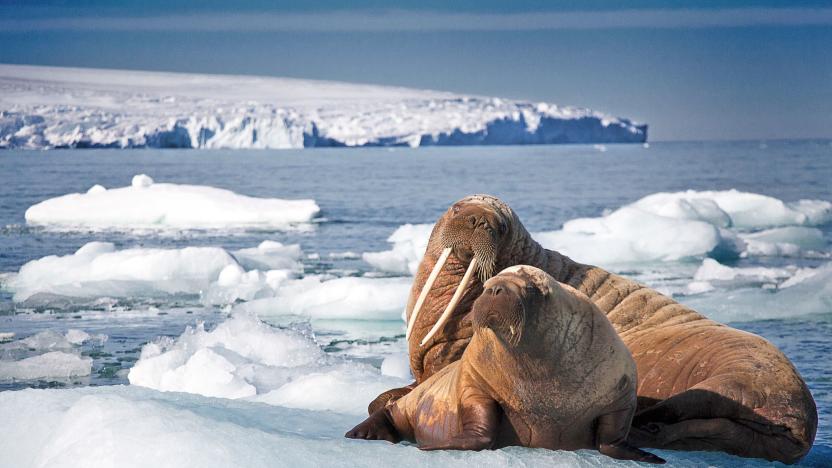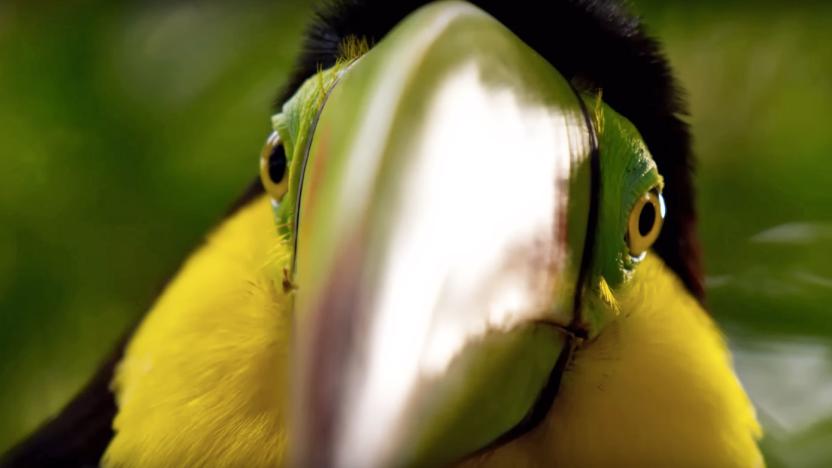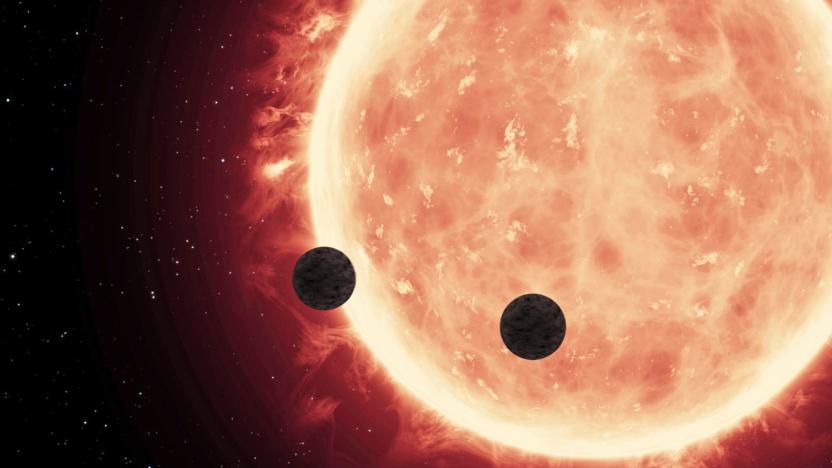nature
Latest

'Timberscrapers' could soon dominate urban skylines
They just don't make 'em like the Sakyamuni Pagoda anymore. Built from wood in 1056 in the Shanxi province of China, the building has remained standing to this day, despite seven earthquakes rattling the region within its first 50 years of existence. Since then, it's held up against a slew of seismic events, even when more-modern structures have failed. Now, thanks to recent advancements in timber technology, modern architects are rediscovering the benefits of working with wood.

Researchers are breeding fluorescent bacteria to uncover landmines
One of the many tragedies of war are the dangers that persist long after conflicts formally end -- dangers like abandoned minefields peppered with active, deadly ordnance. Buried landmines threaten the lives of ordinary people near former battlefields all over the world, and disarming them has always been a dangerous effort. Now, researchers at the Hebrew University of Jerusalem are working on a way to make landmine identification easier and safer. No, the trick isn't to build a better metal detector, it's to cultivate bacteria that glows in the presence of deadly explosives.

BBC nature series 'Blue Planet' will return later this year
Planet Earth II has only just started airing in North America, but already the BBC is working on its next big-budget nature doc. Blue Planet II, a successor to the original Blue Planet series from 2001, will be broadcast in the UK later this year (a US release will probably come a little later.) It'll be narrated by veteran presenter Sir David Attenborough (who else) and return to the world's mysterious oceans, capturing and explaining the various creatures that lurk beneath the surface. These include water-spitting snub fin dolphins, hairy-chested Hoff crabs and a reef octopus.

Photographer captures nature through surveillance webcams
Nature photography usually involves a lot of being outside and walking. That's fine for some, but photographer Marcus DeSieno captures our world's natural majesty from his computer, via online traffic and weather camera feeds.

Motherhood, nature and technology in 'Horizon Zero Dawn'
Horizon Zero Dawn is Guerrilla Games' first original creation since releasing the original Killzone in 2004. Not only is it Guerrilla's first foray into a brand-new universe in 13 years, but it's a completely new genre for the studio: an open-world, action RPG. These are generally massive games with intricate narratives and winding sidequests, as opposed to the constrained, linear nature of most first-person shooters. In order to make sense of a story in Horizon's vast open world, Guerrilla brought on Fallout: New Vegas lead writer John Gonzalez. Gonzalez helped create Aloy, Horizon's protagonist, and the massive landscape that she inhabits -- robot dinosaurs and all.

BBC's 'Planet Earth' team is making a mini VR nature series
While the BBC is respected for its varied slate of programming, its nature documentaries are deservedly elevated above the rest. The corporation's second Planet Earth series recently broke viewing records in the UK and will debut in the US, but it's also been working on a new project that will bring its nature expertise to virtual reality. BBC Earth, the producer behind the groundbreaking footage, has announced a new partnership with Oculus to launch three new VR experiences, which will be available for the Rift and Samsung's Gear VR headsets in the coming weeks.

Cancer consumes fat to feed its metastatic march in mice
Stopping cancer in its tracks may be easier than we thought and possible without debilitating rounds of chemo and radiation therapies. All we have to do is take away its energy source. Researchers at the Institute for Research in Biomedicine at the Barcelona Institute of Science and Technology in Spain have discovered that a cancerous cell's metastasization -- the process through which the disease spreads throughout the body -- relies heavily on the presence of a single molecule which allows the cells to absorb lipid fats from their environment.

SpaceX to launch ocean-monitoring NASA satellite in 2021
Elon Musk's SpaceX has been awarded a new contract to launch a NASA satellite in 2021. The Surface Water and Ocean Topography (SWOT) mission will begin at the Vandenberg Air Force Base in California, using a Falcon 9 rocket to take the research hardware into orbit. From there, NASA will conduct "the first-ever global survey of Earth's surface water," taking detailed recordings that should explain how our oceans change over time. The total cost of the launch is said to be $112 million, however the money won't be going to SpaceX alone. As the Verge reports, some is being put aside for other organisations providing "additional support."

Old Apple computers make excellent plant pots
What should you do with old Apple hardware? Keep it and maintain it as the company intended, old software and all? Or maybe donate it to a museum, where fellow fans can gaze at its chunky keys and adorably low-res display longingly? Christophe Guinet, also known as 'Monsieur Plant,' has another idea. For his latest project, Plant Your Mac!, the Parisian artist has converted some classic Apple products into tiny gardens. All of the machines, which include the Macintosh Classic, the iMac G3 and G5, now house a selection of lush, exotic plants in unusual, imaginative ways.

New BBC app highlights the best of David Attenborough
On Sir David Attenborough's 90th birthday earlier this year, the BBC announced it was developing a mobile app to showcase the veteran presenter's huge body of work. "Attenborough's Story of Life" is finally available to download for iOS and Android today, and features more than 1,000 curated clips from the 40-plus BBC shows Attenborough has been involved in over the past 60 years. Best of all, it's available worldwide for free, so while Brits are enjoying fresh weekly installments of 4K nature porn courtesy of Planet Earth II, the new app means everyone else can get their Attenborough fix too.

ICYMI: Snap Inc. knows people want its video sunglasses
try{document.getElementById("aol-cms-player-1").style.display="none";}catch(e){}Today on In Case You Missed It: Snap Inc. dropped a Spectacles vending machine in Southern California and the sunglasses were snapped up in no time. If you don't have the thousands of dollars handy that you'd need to pay for them on eBay, you can virtually try them on inside Snapchat by taking a photo of the ghost logo on the Spectacles site (which is what I did in today's photo. Ugh.). The video of the vending machine giggling to earth is here. The story about Samsung filing a patent for a smartphone that folds in half is here. The Nature study about monkeys being able to walk again after paralysis is here. And while there are many things to catch up on this week, we recommend reading up on President-elect Donald Trump's pick for the Environmental Protection Agency's transition team. As always, please share any interesting tech or science videos you find by using the #ICYMI hashtag on Twitter for @mskerryd.

Nature documentary 'Planet Earth II' looks absolutely stunning
For people who love showing off their high-end A/V gear, documentaries from BBC Earth are about as good as it gets for infinitely rewatchable reference material. But the clock ticks ever forward and some of those older releases don't look quite as good anymore thanks to screen sizes getting dramatically bigger and pixel counts higher. But now we have our first glimpse at the shot-in-4K Planet Earth II by way of a trailer from BBC One.

ICYMI: All aboard the world's largest boat elevator
try{document.getElementById("aol-cms-player-1").style.display="none";}catch(e){}Today on In Case You Missed It: The Three Gorges Dam in China is home to the largest ship elevator, hauling up to 3000 tons of cargo from one lower level of water to the higher stream at the top. Meanwhile, Georgia Tech engineers believe their new fabric, which can harvest energy from both movement and the sun, will revolutionize how we keep devices charged. The three baby parent video is here, and the crystallizing salts are here. As always, please share any interesting tech or science videos you find by using the #ICYMI hashtag on Twitter for @mskerryd.

ICYMI: Animals can communicate better than we'd realized
try{document.getElementById("aol-cms-player-1").style.display="none";}catch(e){}Today on In Case You Missed It: We are adding horses to the list of animals who can communicate via some form of symbolic language, now that researchers taught a group of horses how to understand three symbols related to whether they wanted a blanket covering on or not. With that, horses, primates, dolphins and birds can all communicate with us -- and suddenly old masterpieces like Mister Ed and The Birds have a whole new significance.

Hubble study finds two potentially habitable exoplanets
Scientists from MIT and the University of Liège studying a planetary system orbiting the star TRAPPIST–1 have discovered two rocky, Earth-like and potentially habitable planets only 40 light years away from home. According to a paper published in Nature today, the atmospheres on planets TRAPPIST–1b and TRAPPIST–1c are likely to be dense and compact like the atmospheres of Earth, Venus and Mars.

HIV antibodies guarded monkeys from the disease for six months
There's no known vaccine for HIV, but researchers have a temporary preventative treatment in the works. A team of American and German scientists tested a quartet of injectable antibodies in monkeys that staved off the human immunodeficiency virus for up to six months, according to a paper published in Nature. The antibodies were harvested from HIV-infected people, cleaned and then given to macaques before they were dosed with a strain of simian HIV.

ICYMI: Ford night riding, AI sphere that delivers and more
#fivemin-widget-blogsmith-image-974841{display:none;} .cke_show_borders #fivemin-widget-blogsmith-image-974841, #postcontentcontainer #fivemin-widget-blogsmith-image-974841{width:570px;display:block;} try{document.getElementById("fivemin-widget-blogsmith-image-974841").style.display="none";}catch(e){}Today on In Case You Missed It: Ford is testing self-driving cars on a completely dark night course, designed to be used without headlights. An automation company built a flying sphere that can pick up and deliver things with a very sphincter-like gripper system. And Schaft Inc. is showing off its new bipedal robot that can walk on rocky beaches easily. The physicist who is thrilled about his job specializing in snowflakes is a must-watch (post-Zombie fakeout, of course). As always, please share any great tech or science videos you find by using the #ICYMI hashtag on Twitter for @mskerryd.

New fuel cell tech could power phones for a week
No matter how efficient our devices get in terms of power usage, there's really only so much manufacturers can do given the limitations of the energy source: lithium-ion batteries. But researchers from Pohang University of Science and Technology in South Korea have designed what they're calling a miniaturized solid oxide fuel cell that could replace current battery tech in everything from mobile devices to drones. What's more, the tech could even be scaled up for larger applications including electric vehicles.

A common crop pesticide is making bees dumb
Poor honeybees. Back in 2010, the USDA found a possible link between pesticides used to kill varroa mites and colony collapse disorder. Now, researchers from the University of Otago in New Zealand have discovered that they can "suffer severe learning and memory deficits" if they ingest even tiny doses of a common pesticide used to keep apples, broccoli, corn and other crops insect-free. That pesticide is a controversial chemical called chlorpyrifos. The Environmental Protection Agency and the state of California proposed banning or at least imposing heavy restrictions on its use in the past due to reports that it makes farm workers sick.

Coral reefs will continue dying unless carbon output drops
Growing an endangered species of coral in a lab is one thing, but rebuilding a reef damaged by ocean acidification is a complete other. On paper, though, it's possible. A group of researchers attempted to counter the effects of rising carbon dioxide levels around Australia's Great Barrier Reef by pumping sodium hydroxide into lagoons that were isolated from the ocean during low tide, according to The Verge.









